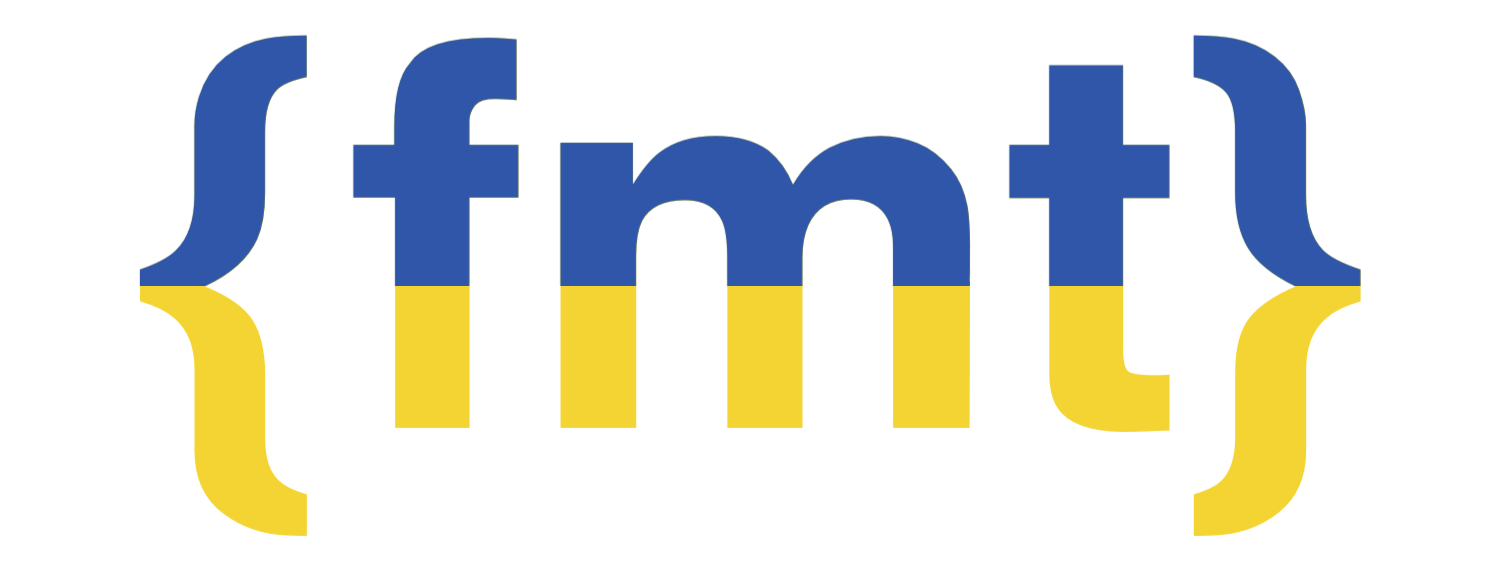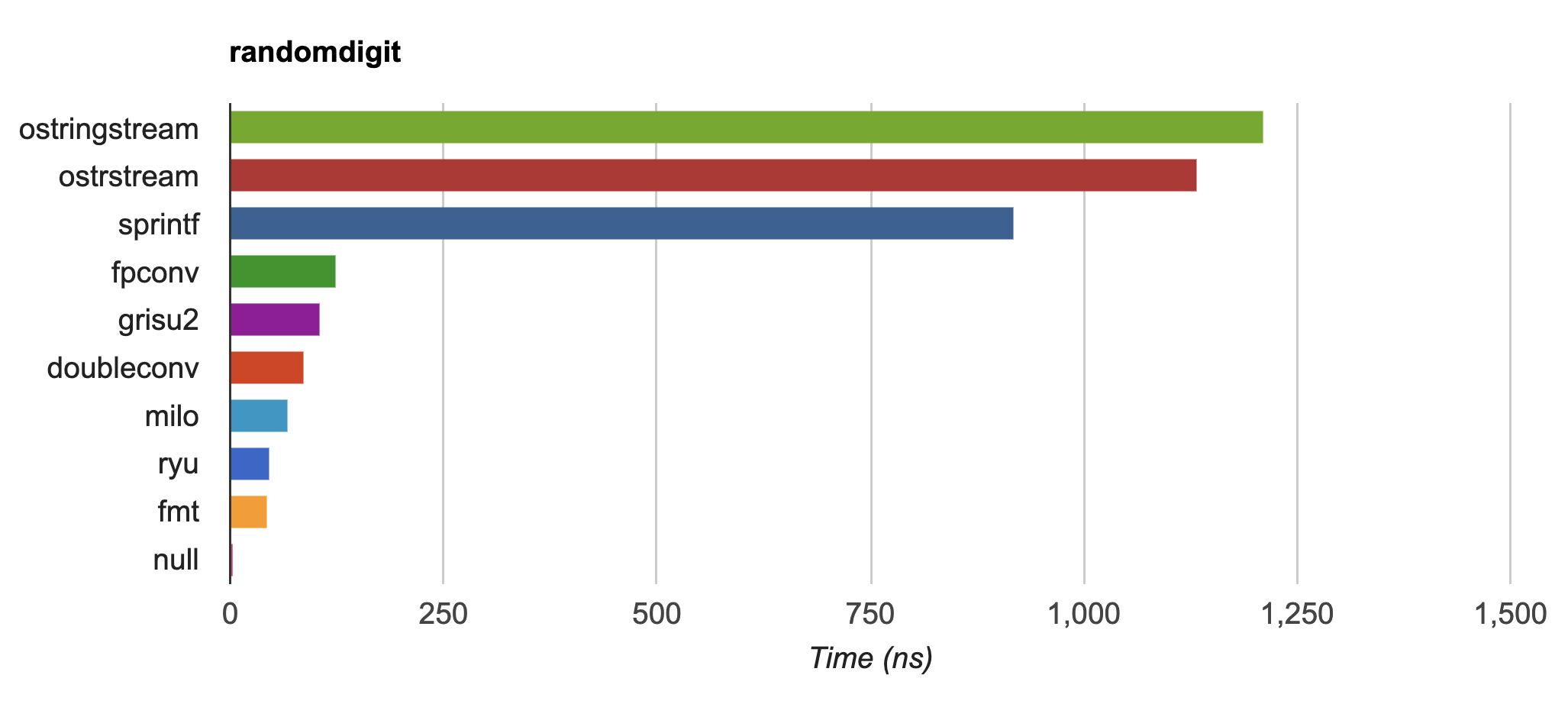
{fmt} is an open-source formatting library providing a fast and safe alternative to C stdio and C++ iostreams.
If you like this project, please consider donating to one of the funds that help victims of the war in Ukraine: https://www.stopputin.net/.
Q&A: ask questions on StackOverflow with the tag fmt.
Try {fmt} in Compiler Explorer.
Features
Simple format API with positional arguments for localization
Implementation of C++20 std::format and C++23 std::print
Format string syntax similar to Python's format
Fast IEEE 754 floating-point formatter with correct rounding, shortness and round-trip guarantees using the Dragonbox algorithm
Portable Unicode support
Safe printf implementation including the POSIX extension for positional arguments
Extensibility: support for user-defined types
High performance: faster than common standard library implementations of
(s)printf, iostreams,to_stringandto_chars, see Speed tests and Converting a hundred million integers to strings per secondSmall code size both in terms of source code with the minimum configuration consisting of just three files,
base.h,format.handformat-inl.h, and compiled code; see Compile time and code bloatReliability: the library has an extensive set of tests and is continuously fuzzed
Safety: the library is fully type-safe, errors in format strings can be reported at compile time, automatic memory management prevents buffer overflow errors
Ease of use: small self-contained code base, no external dependencies, permissive MIT license
Portability with consistent output across platforms and support for older compilers
Clean warning-free codebase even on high warning levels such as
-Wall -Wextra -pedanticLocale independence by default
Optional header-only configuration enabled with the
FMT_HEADER_ONLYmacro
See the documentation for more details.
Examples
Print to stdout (run)
Format a string (run)
Format a string using positional arguments (run)
Print dates and times (run)
Output:
Print a container (run)
Output:
Check a format string at compile time
This gives a compile-time error in C++20 because d is an invalid format specifier for a string.
Write a file from a single thread
This can be 5 to 9 times faster than fprintf.
Print with colors and text styles
Output on a modern terminal with Unicode support:
Benchmarks
Speed tests
| Library | Method | Run Time, s |
|---|---|---|
| libc | printf | 0.91 |
| libc++ | std::ostream | 2.49 |
| {fmt} 9.1 | fmt::print | 0.74 |
| Boost Format 1.80 | boost::format | 6.26 |
| Folly Format | folly::format | 1.87 |
{fmt} is the fastest of the benchmarked methods, ~20% faster than printf.
The above results were generated by building tinyformat_test.cpp on macOS 12.6.1 with clang++ -O3 -DNDEBUG -DSPEED_TEST -DHAVE_FORMAT, and taking the best of three runs. In the test, the format string "%0.10f:%04d:%+g:%s:%p:%c:%%\n" or equivalent is filled 2,000,000 times with output sent to /dev/null; for further details refer to the source.
{fmt} is up to 20-30x faster than std::ostringstream and sprintf on IEEE754 float and double formatting (dtoa-benchmark) and faster than double-conversion and ryu:
Compile time and code bloat
The script bloat-test.py from format-benchmark tests compile time and code bloat for nontrivial projects. It generates 100 translation units and uses printf() or its alternative five times in each to simulate a medium-sized project. The resulting executable size and compile time (Apple clang version 15.0.0 (clang-1500.1.0.2.5), macOS Sonoma, best of three) is shown in the following tables.
Optimized build (-O3)
| Method | Compile Time, s | Executable size, KiB | Stripped size, KiB |
|---|---|---|---|
| printf | 1.6 | 54 | 50 |
| IOStreams | 25.9 | 98 | 84 |
| fmt 83652df | 4.8 | 54 | 50 |
| tinyformat | 29.1 | 161 | 136 |
| Boost Format | 55.0 | 530 | 317 |
{fmt} is fast to compile and is comparable to printf in terms of per-call binary size (within a rounding error on this system).
Non-optimized build
| Method | Compile Time, s | Executable size, KiB | Stripped size, KiB |
|---|---|---|---|
| printf | 1.4 | 54 | 50 |
| IOStreams | 23.4 | 92 | 68 |
| {fmt} 83652df | 4.4 | 89 | 85 |
| tinyformat | 24.5 | 204 | 161 |
| Boost Format | 36.4 | 831 | 462 |
libc, lib(std)c++, and libfmt are all linked as shared libraries to compare formatting function overhead only. Boost Format is a header-only library so it doesn't provide any linkage options.
Running the tests
Please refer to Building the library for instructions on how to build the library and run the unit tests.
Benchmarks reside in a separate repository, format-benchmarks, so to run the benchmarks you first need to clone this repository and generate Makefiles with CMake:
Then you can run the speed test:
or the bloat test:
Migrating code
clang-tidy v18 provides the modernize-use-std-print check that is capable of converting occurrences of printf and fprintf to fmt::print if configured to do so. (By default it converts to std::print.)
Notable projects using this library
0 A.D.: a free, open-source, cross-platform real-time strategy game
AMPL/MP: an open-source library for mathematical programming
Apple's FoundationDB: an open-source, distributed, transactional key-value store
Aseprite: animated sprite editor & pixel art tool
AvioBook: a comprehensive aircraft operations suite
Blizzard Battle.net: an online gaming platform
Celestia: real-time 3D visualization of space
Ceph: a scalable distributed storage system
ccache: a compiler cache
ClickHouse: an analytical database management system
ContextVision: medical imaging software
Contour: a modern terminal emulator
CUAUV: Cornell University's autonomous underwater vehicle
Drake: a planning, control, and analysis toolbox for nonlinear dynamical systems (MIT)
Envoy: C++ L7 proxy and communication bus (Lyft)
FiveM: a modification framework for GTA V
fmtlog: a performant fmtlib-style logging library with latency in nanoseconds
Folly: Facebook open-source library
GemRB: a portable open-source implementation of Bioware's Infinity Engine
Grand Mountain Adventure: a beautiful open-world ski & snowboarding game
HarpyWar/pvpgn: Player vs Player Gaming Network with tweaks
KBEngine: an open-source MMOG server engine
Keypirinha: a semantic launcher for Windows
Kodi (formerly xbmc): home theater software
Knuth: high-performance Bitcoin full-node
libunicode: a modern C++17 Unicode library
MariaDB: relational database management system
Microsoft Verona: research programming language for concurrent ownership
MongoDB: distributed document database
MongoDB Smasher: a small tool to generate randomized datasets
OpenSpace: an open-source astrovisualization framework
PenUltima Online (POL): an MMO server, compatible with most Ultima Online clients
PyTorch: an open-source machine learning library
quasardb: a distributed, high-performance, associative database
Quill: asynchronous low-latency logging library
QKW: generalizing aliasing to simplify navigation, and execute complex multi-line terminal command sequences
redis-cerberus: a Redis cluster proxy
redpanda: a 10x faster Kafka® replacement for mission-critical systems written in C++
rpclib: a modern C++ msgpack-RPC server and client library
Salesforce Analytics Cloud: business intelligence software
Scylla: a Cassandra-compatible NoSQL data store that can handle 1 million transactions per second on a single server
Seastar: an advanced, open-source C++ framework for high-performance server applications on modern hardware
spdlog: super fast C++ logging library
Stellar: financial platform
Touch Surgery: surgery simulator
TrinityCore: open-source MMORPG framework
🐙 userver framework: open-source asynchronous framework with a rich set of abstractions and database drivers
Windows Terminal: the new Windows terminal
If you are aware of other projects using this library, please let me know by email or by submitting an issue.
Motivation
So why yet another formatting library?
There are plenty of methods for doing this task, from standard ones like the printf family of function and iostreams to Boost Format and FastFormat libraries. The reason for creating a new library is that every existing solution that I found either had serious issues or didn't provide all the features I needed.
printf
The good thing about printf is that it is pretty fast and readily available being a part of the C standard library. The main drawback is that it doesn't support user-defined types. printf also has safety issues although they are somewhat mitigated with __attribute__ ((format (printf, ...)) in GCC. There is a POSIX extension that adds positional arguments required for i18n to printf but it is not a part of C99 and may not be available on some platforms.
iostreams
The main issue with iostreams is best illustrated with an example:
which is a lot of typing compared to printf:
Matthew Wilson, the author of FastFormat, called this "chevron hell". iostreams don't support positional arguments by design.
The good part is that iostreams support user-defined types and are safe although error handling is awkward.
Boost Format
This is a very powerful library that supports both printf-like format strings and positional arguments. Its main drawback is performance. According to various benchmarks, it is much slower than other methods considered here. Boost Format also has excessive build times and severe code bloat issues (see Benchmarks).
FastFormat
This is an interesting library that is fast, safe and has positional arguments. However, it has significant limitations, citing its author:
Three features that have no hope of being accommodated within the current design are:
Leading zeros (or any other non-space padding)
Octal/hexadecimal encoding
Runtime width/alignment specification
It is also quite big and has a heavy dependency, on STLSoft, which might be too restrictive for use in some projects.
Boost Spirit.Karma
This is not a formatting library but I decided to include it here for completeness. As iostreams, it suffers from the problem of mixing verbatim text with arguments. The library is pretty fast, but slower on integer formatting than fmt::format_to with format string compilation on Karma's own benchmark, see Converting a hundred million integers to strings per second.
License
{fmt} is distributed under the MIT license.
Documentation License
The Format String Syntax section in the documentation is based on the one from Python string module documentation. For this reason, the documentation is distributed under the Python Software Foundation license available in doc/python-license.txt. It only applies if you distribute the documentation of {fmt}.
Maintainers
The {fmt} library is maintained by Victor Zverovich (vitaut) with contributions from many other people. See Contributors and Releases for some of the names. Let us know if your contribution is not listed or mentioned incorrectly and we'll make it right.
Security Policy
To report a security issue, please disclose it at security advisory.
This project is maintained by a team of volunteers on a reasonable-effort basis. As such, please give us at least 90 days to work on a fix before public exposure.

